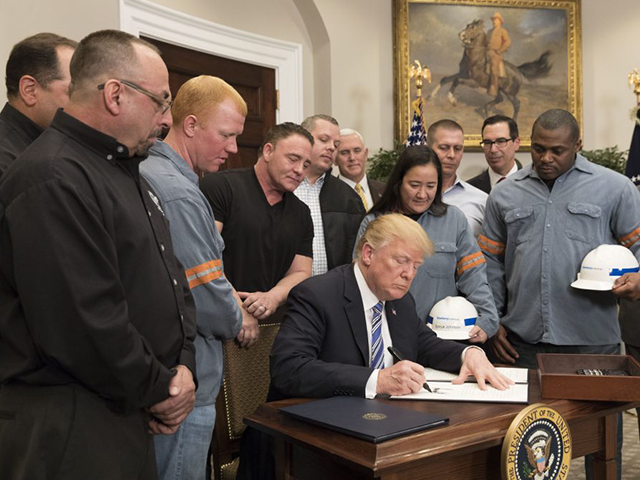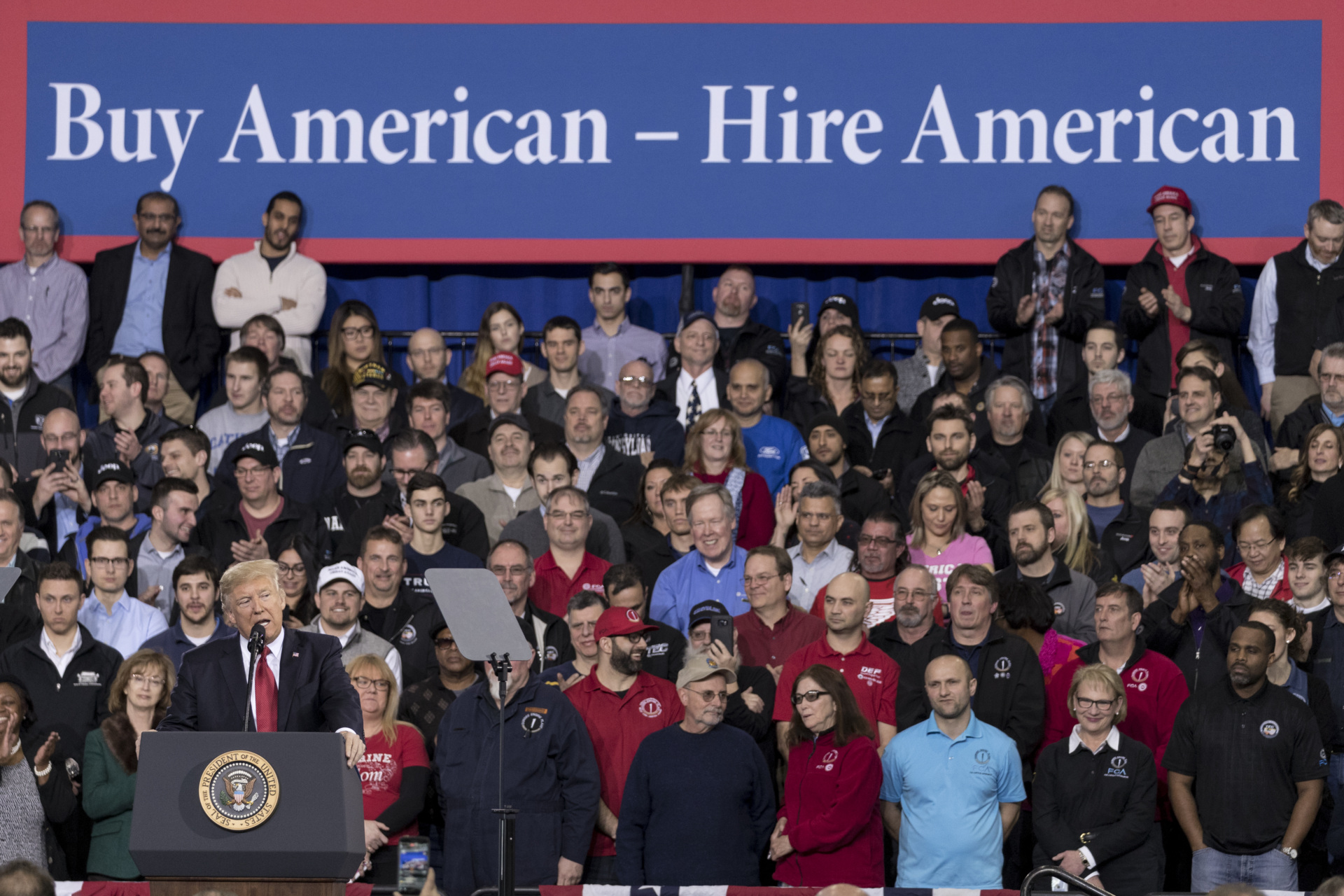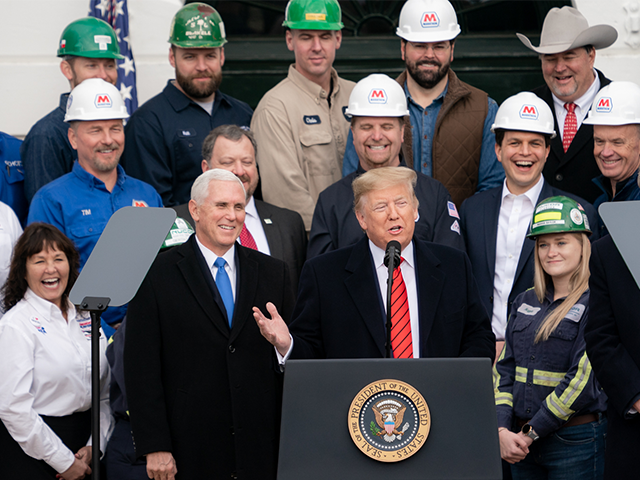Trade Wars Are Good—and We’re Winning Easily
Donald Trump famously proclaimed that “Trade wars are good and easy to win.”
One of the great virtues of Trump is his willingness to directly contradict the conventional wisdom of our expert classes and to do so succinctly. The prevailing view among American economists, politicians, and pundits has long been that trade wars are bad and impossible to win.
Is that still the prevailing view? Contrary to expectations, President Joe Biden not only left Trump’s tariffs in place but also introduced new tariffs and trade barriers. From the buy America requirements in the green infrastructure bill absurdly called the Inflation Reduction Act to the recent 100 percent duty on Chinese electric vehicles, Biden has followed in the path blazed by Trump rather than repudiate it as expected.
Given Biden’s support of tariffs, it will be curious to see what role trade policy plays in tonight’s presidential debate. Biden cannot castigate Trump’s trade tariffs because those are now also Biden’s tariffs. The moderators of the debate, however, could very well challenge Trump and Biden on tariffs, likely repeating the debunked myth that tariffs are taxes on consumers.

President Donald Trump, surrounded by American steel workers, signs the Section 232 Proclamations on Steel and Aluminum Imports which imposed tariffs to protect the American steel industry on March 9, 2018, in the White House. (Official White House Photo by Joyce N. Boghosian via Flickr)
Donald Trump and the Tariffs Steelman
When Trump first announced tariffs on aluminum and steel, there were howls of protest from Wall Street, the tenured economist clique, the establishment media, legacy globalist trade Republicans, and the kind of resistance progressives who would despise ice cream if they saw Trump enjoying a cone. One of the biggest claims made at the time was that the tariffs would do something uncomfortable to consumers. They would squeeze consumers, pinch consumers, and bite consumers by pushing up prices of things made of steel and aluminum.
Most of these complaints conveniently overlooked the national security arguments that were the core rationale for the tariffs. They treated the metals tariffs as if they were simply protectionist, meant to protect the profits of U.S. metals manufacturers rather than the industrial metal-making capacity of the nation. They ignored the fact that the aluminum sector was barely viable and the steel industry just years from crumbling. Some of the objections focused on how few jobs would be protected, arguing that the increased costs the tariffs were alleged to impose would cost more jobs, an argument that entirely misses the point of treating these as strategically important industries.
Even those that took notice of the national security argument excoriated the application of the tariffs to allies such as Canada. Why would we ever have to worry about being dependent on Canada for steel or aluminum? Surely there was no imaginable case in which we might be cut off from strategic metals by allies? Hopefully now with the U.S. increasingly isolated in our support for Israel in the Gaza war launched by Hamas those questions have now been answered. If the U.S. wants to maintain our strategic independence, we cannot afford to assume that our allies will always be willing to supply us with the materials we use to make the machinery of wars.
In any case, the argument that tariffs would push up prices of metals never made sense even in terms of basic economic theory. Trade theory has long maintained that tariffs imposed by a large country should drive down foreign prices as U.S. currency appreciates and foreign manufacturers fight to maintain market share. What’s more, economic theory indicates that importers of tariffed materials are not necessarily able to pass on all or even some of the increased costs of imports or domestic substitutes; they are more likely instead to absorb the costs through lower margins.
In fact, in a situation where domestic production is held down not by low priced foreign imports but by the threat of foreign dumping, there may not even be any increased cost associated with the tariffs. Free from the threat of foreign dumping, U.S. firms can attract investment to increase their production and supply materials at the same or even lower prices than prevailed under the pre-tariff regime of predatory mercantilism practiced by rival producing nations.
We’ve now had enough years of tariffs to see that much of their cost was indeed absorbed by foreign producers. A study by economists Mary Amiti, Stephen J. Redding, and David E. Weinstein found that foreign steel prices dropped in response to Trump’s tariffs.
The authors of the study found:
The data show that U.S. tariffs have caused foreign exporters of steel to substantially lower their prices into the U.S. market. Thus, foreign countries are bearing close to half the cost of the steel tariffs. Since China is only the tenth largest steel supplier to the U.S. market, these costs have largely been borne by regions like the EU, South Korea and Japan. This is likely good news for U.S. firms that demand steel, but bad news for workers hoping that steel tariffs will bring back jobs. Indeed, the fact that foreign steel producers have lowered their prices in response to U.S. tariffs may help explain why U.S. steel production only rose by 2 percent per year between the third quarter of 2017 and the third quarter of 2019 despite 25 percent steel tariffs.
Note that what the authors treat as “failures” of the policy are nothing of the sort. The purpose of the tariffs was not to increase steel employment, although that may have been a salutary side-effect. The tariffs were introduced at a time of low unemployment; so, job creation would have been an odd justification. Similarly, the tariffs were not meant to lock-out all foreign steel. Rather, they were intended to stop the deterioration of the domestic market for U.S. steel and aluminum and therefore make our domestic productive capacity viable. Increased U.S. steel production by two percent per year seems to have done the job. The once written-off for dead domestic steel industry is now attracting bids from Japan!
Another way of putting this is that the steel tariffs improved the terms of trade for the United States. Trump’s tariff policies forced foreign producers to offer their products for lower prices, transferring what was their profit to revenue for the U.S. government. Since that revenue offsets revenue that would otherwise have been collected in taxes on domestic incomes of individuals and businesses, this is a boon for Americans. The tariffs transferred wealth into the United States.
Tariffs, Trade Theory, and the Virtue of Fighting Back
We’ve focused on the metals tariffs here for the sake of simplicity, but the story is similar throughout the tariffs on the nearly $400 billion of imports Trump imposed while president. The exact effects vary, of course. Sometimes more of the tariffs were borne by importers, sometimes more by foreign producers. In a very few instances, consumer prices of tariff items rose, but these were offset by lower consumer prices or higher incomes enabling consumers to better afford higher prices. The tariffs generally improved the terms of trade for the U.S., making us a wealthier country.

President Donald Trump delivers remarks at the American Center for Mobility in Ypsilanti, Michigan, on March, 15, 2017. (Official White House Photo by Shealah Craighead via Flickr)
A crucial error critics of tariffs made during the Trump administration—and are still making when they attack Trump’s new tariff proposals—is that they ignore the actual policies and simply attack demons of their own imagination. They treat all new tariff proposals as if they were efforts to protect domestic monopolist profits (something which admittedly did happen at times in our history) or as efforts to protect inefficient jobs (also a practice that has historical precedent). What they do not do is treat tariffs as a strategy to improve the terms of trade for the United States.
Decades ago, economists became aware of the idea that it was possible for a nation to use tariffs and trade barriers to enrich itself. This was called “optimal tariff theory.“ As long as tariffs were not set too high, they could cause adjustments in currency valuations and foreign pricing that would improve the terms of trade for the nation imposing tariffs. The problem was that this only really worked if the trading partners didn’t respond with tariffs of their own.
Think of it like a form of the prisoner’s dilemma that game theorists like to talk about. The biggest payoff for either prisoner is to rat out the other but not be ratted out. The mid-sized payoff is if both sides refuse to snitch. The second-worst payoff is both sides snitching against the other. The very worst is being the guy who refuses to snitch but gets snitched upon.
In theory, free trade aims for the mid-sized payoff. In practice, however, a nation that advertises that it will pursue free trade invites its trading partners to defect and practice optimal tariff theory against it by erecting trade barriers.
The U.S. had been the prisoner that would almost never snitch—inviting China, the European Union, Japan, and every other trading partner to engage in predatory mercantilism. By introducing tariffs, Trump changed the game. It’s now no longer safe to be the trade barrier erecting snitch. Trump’s tariffs forced other countries to offer the U.S. better terms of trade.
This is why a trade war is easy to fight and easy to win. Because if you don’t fight it, you are simply surrendering and guaranteed to lose. Simply by showing you are willing to fight, you can win. You win the trade war by using tariffs and the threat of tariffs to convince other countries to stop engaging in predatory mercantilism against you. To put it differently, tariffs are necessary to negotiating appropriate terms of trade that do not drain the U.S. of wealth and productive capacity.
Trump has a chance to defend his title of “Tariff Man” in tonight’s debate. We’re hoping he takes it.

COMMENTS
Please let us know if you're having issues with commenting.